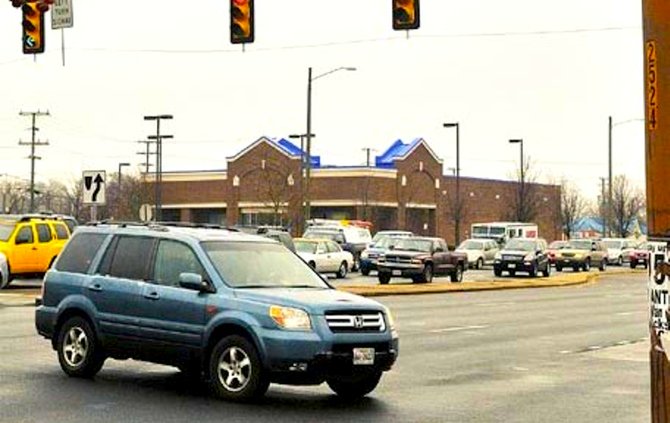Back-ups on the left-turn lane at the Kings Crossing Wal-Mart have added to existing gridlock on Route 1. Photo by Louise Krafft.
Nowhere is the idea of a transportation impact fee more popular than the clogged Route 1 corridor, where the Wal-Mart at Kings Crossing has added to the gridlock that has long plagued the region. Because the developer did not ask for increased density or other variances, no rezoning was needed. And because the project was developed “by-right,” county officials were not able to use the proffer system to ask developer J.B.G. Rosenfeld for the money needed to extend the turn lane into the popular retail mega-store.
Enter the impact fee.
If Fairfax County created a new transportation impact fee, county officials could charge the developer for the cost of the turn lane — regardless of whether a rezoning was needed or not. It’s an idea that’s gaining popularity in Mount Vernon, where the gridlock at Kings Crossing has created a lingering distaste for the shortcomings of the proffer system.
“I think it’s a fair way of dealing with by-right development, and I certainly don’t think that it would keep a project from being developed,” said Jim Davis, co-chairman of the Mount Vernon Council of Citizens Associations. “It is imperative that we do have a more balanced system to spur growth and have a way to mitigate things that can degrade the quality of life here.”
The idea has yet to receive formal consideration, although people have been talking about it informally since last spring. The Southeast Fairfax Development Corporation has not yet formally considered the idea, and so the organization does not have a position. But president David Versel says the idea is likely to generate a variety of responses.
“If you are talking to somebody who owns a property who wants to do something by-right, then I would have to believe they would not support paying an impact fee they currently don’t have to pay,” said Versel. “But maybe there’s another business that wants to see traffic improved, and they would support it.
SINCE 1989, the county has had the authority to levy impact fees. But the Fairfax County Board of Supervisors never took advantage of that power. When board members considered whether or not to adopt such a system several years ago, the elected officials determined that they wanted to stay with the current proffer system rather than trying to create a hybrid system with both.
“I think if we tried to do both, we would end up with a classic battle with our development community,” said Mount Vernon District Supervisor Gerry Hyland in an interview last year. “We came to the conclusion many years ago that we would get more out of a proffer system, which is why we decided to go that route.”
Now the gridlock created at Kings Crossing has reopened the Board of Supervisors’ long-standing decision against seeking impact fees. Last year, the Mount Vernon Council of Citizens Associations passed a resolution urging the Board of Supervisors to impost impact fees on any development needing a building permit. Once a fee system had been created, the resolution suggested, county officials could use the revenue to pay for “building reasonable transportation infrastructure to benefit the development.” Hyland’s office responded with a memorandum outlining concerns about redeveloping the Route 1 corridor.
“Staff is concerned that an impact fee program would apply to all redevelopment in the corridor,” the memo reported. “Impact fees may discourage redevelopment in this area and undermine the county’s goal to foster redevelopment in this designated commercial revitalization area.”
MANY MOUNT VERNON residents say the impact fee is a desperately needed tool that should be used when developers do not need to rezone. Without it, they say, residents are stuck with gridlock and taxpayers are eventually handed a bill to fix the problem. Those who are pushing for the creation of an impact fee say concerns about redevelopment should take a backseat to concerns about quality of life.
“If by-right development does not improve transportation infrastructure, it should not be built,” wrote Mount Vernon Council of Citizens Association Transportation Committee Chairwoman Catherine Voorhees.
